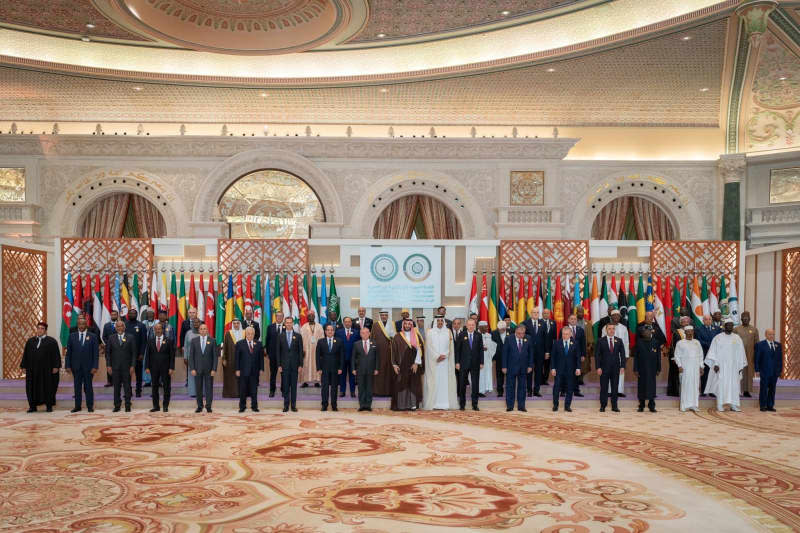African leaders at Riyadh summit demand immediate ceasefire and two-state solution in middle east crisis

In a pivotal meeting convened on November 11 by Saudi Arabia’s King Salman Bin Abdulaziz Al-Saud, leaders from the Organization of Islamic Cooperation (OIC) and the Arab League gathered in Riyadh to address the escalating conflict in the Middle East.
Among those present were Nigerian President Bola Ahmed Tinubu, Senegalese President Bassirou Diomaye Faye, and Mauritanian President Mohamed Ould Cheikh El Ghazouani, who all voiced urgent appeals for a two-state solution and an end to violence in Gaza.
President Tinubu underscored Nigeria’s steadfast support for a two-state solution that ensures security for both Israelis and Palestinians.
“The conflict in Palestine has endured far too long and has caused immense suffering,” he stated, calling on Israel to cease its military actions in Gaza and advocating for an immediate ceasefire.
Tinubu emphasized, “As representatives of nations committed to justice, human dignity, and the sanctity of life, we have a moral duty to end this conflict now.
Condemnations alone are insufficient; the world must act to halt Israel’s prolonged aggression in Gaza.”
The Nigerian leader also urged respect for civilian rights and adherence to international legal norms in the region.
His remarks were echoed by Senegal’s President Bassirou Diomaye Faye, who lamented the United Nations Security Council’s inaction.
“It is disheartening to witness the Security Council’s lack of response to repeated violations in Lebanon and Palestine.
This inaction undermines the hope for a ceasefire and erodes the credibility of the UN as a peacekeeping body,” Faye asserted.
Mauritania’s President El Ghazouani reiterated that a two-state solution remains the only viable path to lasting peace in the region, urging a comprehensive political resolution that allows Israel and Palestine to coexist peacefully.
The summit, initiated by Saudi diplomacy, focused heavily on the crises in Palestine and Lebanon, which have seen deadly airstrikes and raids by Israeli forces.
Participants adopted a 38-point resolution, demanding an immediate ceasefire in Gaza and Lebanon, protection for civilians, and unimpeded humanitarian aid access.
The resolution highlighted the sovereignty of Palestinians over East Jerusalem (Al-Quds) and rejected any attempts to alter the city’s historical and legal status.
It also emphasized safeguarding Islamic and Christian holy sites, particularly the Al-Aqsa Mosque.
Leaders commended mediation efforts by Egypt and Qatar, alongside the U.S., and supported the “International Coalition for the Implementation of a Two-State Solution” launched in September 2024 in New York.
Proposed measures included banning arms exports to Israel, boycotting settlement products, and increasing financial aid to Palestine.
The resolution also called for establishing an international commission to investigate alleged crimes in the region.
The leaders further condemned Israeli actions in Lebanon and demanded full implementation of UN Security Council Resolution 1701.
To strengthen international backing for the Palestinian cause, the Arab League, OIC, and African Union formalized a tripartite cooperation mechanism.
This underscores Africa’s growing commitment to achieving a peaceful resolution.
Saudi Arabia will lead a joint Arab-Islamic ministerial committee tasked with monitoring and reporting on the implementation of the summit’s resolutions, ensuring that commitments lead to concrete actions.
About The Author
dailymailafric
I am an avid African news observer, and an active member of Daily Mail Africa.
I’m Passionate about staying informed on diverse topics across the continent,
I actively contribute to publishing on political, economic and cultural developments in Africa.



